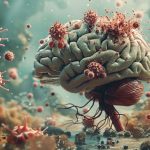By the time we men hit our 30s, our testosterone levels naturally start declining. But over the past several decades, testosterone levels in the U.S. have been dropping more quickly than they did 30 years ago.
Since the late 1980’s, average levels of testosterone in men dropped by one percent each year. So a 65-year-old man in 2021 would have levels 30% lower than a 65-year-old man in 1991. These decreases don’t appear to be associated with lifestyle, so why the big decline?
Well, these days estrogen mimics, called xenoestrogens, are all over the place. These fake estrogens attach to certain cell receptor sites and displace testosterone. Over time they build up in your system and exert estrogen dominance in men. And you can find them almost everywhere.
Bisphenol-A is horrible. You’ll find it in food wraps, plastics and the plastic linings of cans, where it leaches into your foods and beverages. That’s why I always choose glass storage containers. They’re inert and won’t affect your male hormone levels.
Phthalates are even more insidious. They aren’t just found in plastics. They’re in everything from deodorants to shower curtains to carpeting. In your home, you’ll find them in almost anything that has a fragrance like shampoo, perfume, skin cleansers, air fresheners, laundry detergents and so on. When you use them, the phthalates seep into your body, so it’s a good idea to buy organic personal and home care products.
Farm-raised salmon is loaded with polychlorinated biphenyls, or PCBs. The problem with PCBs is that they build up in the fatty tissue of the fish. That’s where all the healthy omega-3 oils are. So, when you eat a piece of farm-raised salmon hoping to get your omega-3 fix, you’re getting a substantial dose of PCBs that sap your testosterone levels. Wild-caught is always the best choice.
And here’s a bombshell revelation for you. There’s a really good chance your low testosterone levels are actually related to a medication you’re taking every day. I’m talking about statins. These drugs aren’t considered a xenoestrogen, but they are most definitely associated with testosterone loss as they interfere with the production of cholesterol, the initial basic building block of all your steroid hormones…including testosterone.
What Else Sabotages T?
In addition to all of the gender benders in our modern world, there are other factors in your life that can affect your testosterone levels. And not all of them have to do with growing older.
For example, being significantly overweight at any age is linked to declining testosterone. In fact, obesity might just be one of the leading causes of dwindling testosterone levels in men.
It’s also quite common for men with type 2 diabetes to suffer from low T. I see it often enough here in my own practice. But I’m not the only one. It’s estimated that between 33% and 50% of men with this metabolic disorder have low plasma testosterone.
A sedentary lifestyle saps the testosterone right out of your body, even among men of younger ages. This means that every hour you spend as a television-watching-couch-potato you’re robbing your body of the hormone that defines your maleness.
How Can You Promote Healthy Testosterone Levels?
Many men believe that when symptoms of dwindling testosterone levels strike, synthetic testosterone replacement therapy is their only choice.
That’s not true. And, in fact, I discourage it.
You see, these drugs greatly increase your chances of developing a blood clot that can block blood flow. This, in turn, could result in a heart attack or stroke. These clots can even damage the organs in your body and, in some instances, trigger sudden death.
So if it turns out you are deficient, don’t go with mainstream medicine’s idea of forcing fake hormones into your bloodstream. Instead, talk to your doctor about bio-identical hormone replacement therapy (BHRT).
These are natural, plant-based, bio-identical hormones which are EXACT COPIES of the hormones your body naturally produces. They are designed specifically for your own, personal physiological make-up and metabolism. And they can work wonders to boost your natural testosterone levels.
If you don’t qualify for replacement therapy, don’t worry. There are many other ways to spontaneously boost your body’s production of testosterone. And none of them are difficult.
If you need to lose weight or if you have diabetes, take charge. Cut out the unhealthy processed, sugary, refined and processed foods. Instead, choose a fresh, organic and healthy, Mediterranean way of eating. Get plenty of daily physical activity. Make good sleep habits a number one priority.
As you make these changes and transition to a testosterone-friendly lifestyle, you can give your body the support it needs with a few supplements
- Chrysin is a flavonoid that works to prevent the conversion of testosterone to estrogen. As a result of this blocking action, it supports higher testosterone levels. And when combined with an extract of black pepper called bioperine, chrysin may help maintain lower estrogen levels and promote free testosterone levels in as little as one month. For men I recommend 150 mg of chrysin with 5 mg of bioperine daily.
- I also like an herb called tongkat ali (eurycoma longifolia) that supports the production of testosterone while regulating the substance most of it gets bound to. This encourages more free testosterone to remain in your bloodstream. It only takes 100 mg daily to reinforce your testosterone levels.
- Zinc is another big testosterone supporter. It maintains the healthy production of aromatase, an enzyme that reduces the testosterone to estrogen conversion pathway. If you’re eating a zinc-deficient diet, your testosterone levels could drop by almost three-quarters in just 20 short weeks.
With these simple changes, you can rebalance your hormones so you feel more energy, virility and vitality again.
SOURCES:
Thomas G. Travison, Andre B. Araujo, Amy B. O’Donnell, Varant Kupelian, John B. McKinlay, A Population-Level Decline in Serum Testosterone Levels in American Men. The Journal of Clinical Endocrinology & Metabolism. 2007 Jan;92(1)196–202.
John D. Meeker & Russ Hauser.Exposure to Polychlorinated Biphenyls (PCBs) and Male Reproduction. Systems Biology in Reproductive Medicine. 2010. 56:2, 122-131.
Goncharov A, Rej R, Negoita S, Schymura M, Santiago-Rivera A, Morse G; Akwesasne Task Force on the Environment, Carpenter DO. Lower serum testosterone associated with elevated polychlorinated biphenyl concentrations in Native American men. Environ Health Perspect. 2009 Sep;117(9):1454-60.
de Keyser CE, de Lima FV, de Jong FH, Hofman A, de Rijke YB, Uitterlinden AG, Visser LE, Stricker BH. Use of statins is associated with lower serum total and non-sex hormone-binding globulin-bound testosterone levels in male participants of the Rotterdam Study. Eur J Endocrinol. 2015 Aug;173(2):155-65.
Mędraś M, et al. Treatment with statins and testosterone levels in men. Endokrynol Pol. 2014;65(6):464-8.
Dhindsa S, Miller MG, McWhirter CL, Mager DE, Ghanim H, Chaudhuri A, Dandona P. Testosterone concentrations in diabetic and nondiabetic obese men. Diabetes Care. 2010 Jun;33(6):1186-92.
Priskorn L, Jensen TK, Bang AK, Nordkap L, Joensen UN, Lassen TH, Olesen IA, Swan SH, Skakkebaek NE, Jørgensen N. Is Sedentary Lifestyle Associated With Testicular Function? A Cross-Sectional Study of 1,210 Men. Am J Epidemiol. 2016 Aug 15;184(4):284-94.
Walker RF, Zakai NA, MacLehose RF, Cowan LT, Adam TJ, Alonso A, Lutsey PL. Association of Testosterone Therapy With Risk of Venous Thromboembolism Among Men With and Without Hypogonadism. JAMA Intern Med. 2020 Feb 1;180(2):190-197.
FDA Drug Safety Communication: FDA cautions about using testosterone products for low testosterone due to aging; requires labeling change to inform of possible increased risk of heart attack and stroke with use. U.S. Food and Drug Association. Last Updated 2018.
Gambelunghe C, Rossi R, Sommavilla M, Ferranti C, Rossi R, Ciculi C, Gizzi S, Micheletti A, Rufini S. Effects of chrysin on urinary testosterone levels in human males. J Med Food. 2003 Winter;6(4):387-90.
Srinivasan K. Black pepper and its pungent principle-piperine: a review of diverse physiological effects. Crit Rev Food Sci Nutr. 2007;47(8):735-48.
Mohd Effendy N, Mohamed N, Muhammad N, Naina Mohamad I, Shuid AN. Eurycoma longifolia: Medicinal Plant in the Prevention and Treatment of Male Osteoporosis due to Androgen Deficiency. Evid Based Complement Alternat Med. 2012;2012:125761.
Om AS, Chung KW. Dietary zinc deficiency alters 5 alpha-reduction and aromatization of testosterone and androgen and estrogen receptors in rat liver. J Nutr. 1996 Apr;126(4):842-8.
Prasad AS, Mantzoros CS, Beck FW, Hess JW, Brewer GJ. Zinc status and serum testosterone levels of healthy adults. Nutrition. 1996 May;12(5):344-8.



